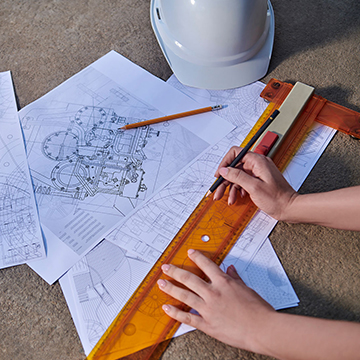
Behind every appliance, constructed or manufactured product in our lives is an engineer. Engineering is the application of mathematics and science to solve problems, and to design and create things that make our lives easier. From bridges to roads, engines to computer systems, rockets to submarines, engineering is involved. There are six major types of engineers. Read further to discover what they are and what they do.
-
Civil Engineering
This is the oldest type of engineering and deals with the built environment. It includes the design and construction of all essential infrastructure we see around us, that our lives depend on - bridges, roads, water supply systems, and sewerage systems, to name a few. Civil engineers can work in planning and overseeing the construction of transportation routes like highways, railroads, and airports, or ensure that our water and waste systems are safely maintained and that plans are in place to manage hazardous waste. They are responsible for making sure that our modern, built environment runs smoothly and safety. -
Mechanical engineering
This type of engineering deals with everything that moves. It is the broadest of engineering disciplines and goes back millennia to the most ancient of societies. Mechanical engineers specialise in the design, development, and manufacture of machines and mechanical systems from screws to elevators. They typically work to improve the efficiency and effectiveness of machines and mechanical systems. Mechanical engineering inventions include the wheel, the pulley, cranes, water wheels, windmills, steam engines, combustion engines and the printing press. In modern times mechanical engineering has been responsible for the invention of refrigeration, airplanes, locomotives and gears. -
Chemical engineering
Chemical engineering graduates are among the most employable graduates in today’s society because they are able to work in a wide range of sectors. Chemical engineering involves the design and construction of processes that create new and useful products from raw materials. Chemical engineers do this through applying the principals of chemistry and mathematics to raw elements to create many of the items we use in our daily lives, from the food we eat to the clothes we wear. Chemical engineering innovations include antibiotics, vaccines, plastic, batteries, and photographic film to name a few. Chemical engineers work in a range of industries that include mineral, chemical, pharmaceutical, food and beverage processing, and energy. -
Electrical engineering
Unlike mechanical and civil engineering, electrical engineering is a relatively new field of engineering which began in the late 19th century with pioneers like Thomas Edison who invented the electric light bulb, and Nikola Tesla who invented the alternating current. Electrical engineering involves developing, generating and using electrical energy to design a range of technologies, from electrical power grids, computer circuits and software programs to navigation systems satellite communications, and broadcast systems. Electrical engineers are employed in a wide range of sectors including power generation, telecommunications, transportation, IT and construction. -
Aerospace and aeronautical engineering
This involves working with aircraft and spacecraft. Initially it was a subset of mechanical engineering but developed into its own field. It is a large industry and technically demanding work. Aerospace and aeronautical engineers work in designing, building, testing and operating vehicles and machines that fly, either here on earth – like airplanes – or in outer space, like satellites and spacecraft. Many aerospace engineers choose to specialise in a particular type of aerospace product whether it be missiles, fighter jets, helicopters or commercial airplanes. Others may choose an area of specialisation like navigation, guidance or instrumentation. -
Computer and software engineering
This is a new discipline within engineering which draws on the principles and science of electrical engineering and computer science. It focuses on the design, construction and maintenance of the software and hardware of computing systems, and on making these systems faster and more efficient. The difference between computer engineering and software engineering is that software engineering involves designing, testing, and maintaining software while computer engineering focuses on the hardware systems.
If you decide that civil engineering is the career for you, have a look at The. IIE Bachelor of Engineering in Civil Engineering qualification, through The IIE’s Varsity College. There is a shortage of skilled civil engineers in South Africa and this professional degree, endorsed by the Engineering Council of South Africa (ECSA), will see you, as a well-prepared graduate, sought after by potential employers. Unlike traditional engineering programmes, the IIE Bachelor of Engineering programme exposes students to the role of engineering in the real world as early as the first year of the programme.
After obtaining suitable experience and further professional development graduates are able to register and practice as a professional engineer.
The Independent Institute of Education (The IIE) is South Africa’s largest registered and accredited private provider of higher education. At The IIE’s Varsity College we understand that no two students are the same, or learn the same. That’s why we make sure a student’s education is shaped around them; how they like to learn, what they are passionate about, what makes them tick, and what makes them thrive. Our Education by Design approach allows students to grow into their best, and creates a space where they can live, learn and play - their way.